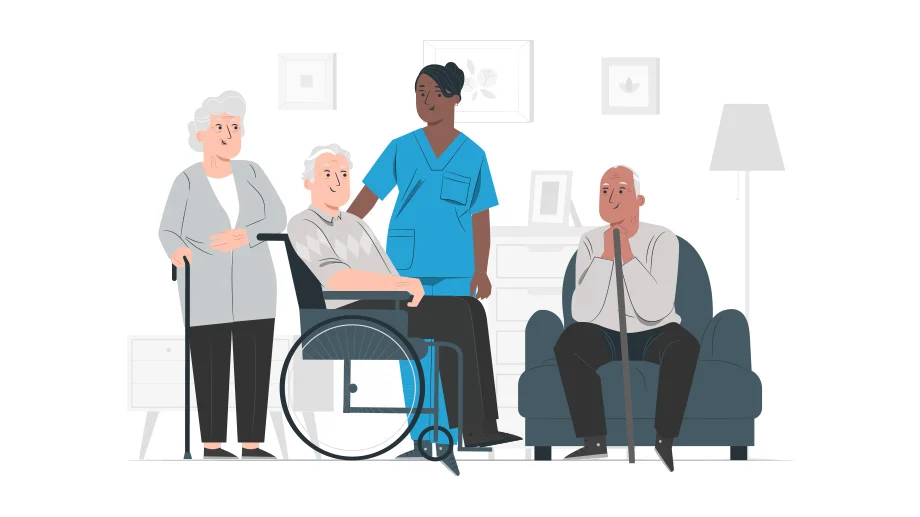Selecting an Electronic Visit Verification system (or EVV vendor) depends on whether your state follows an open or closed model. Regardless of the model, it’s essential to view EVV not just as a compliance requirement but as a tool for driving innovation and broader benefits to your organization.
Adopting new technologies like EVV can be challenging. Healthcare providers need to navigate both legal requirements based on the 21st Century Cures Act, and implementation complexities too.

Leveraging EVV for improved care delivery, faster medical billing, and reduced fraud requires strategic thinking. Achieving these goals hinges on always-available data, made possible by selecting an EVV vendor that seamlessly integrates compliance with efficiency.
Closed states provide a set EVV system that all providers must use. But for open states, providers have the flexibility to choose their own vendors. To make an informed choice, managers should analyze their business needs and then select the best EVV vendor.
If you are a home health care services (HHCS) provider, it is likely that questions such as “How to select EVV software?”, or “Which EVV Vendor is ideal for my business” have crossed your mind.
In this blog, explore how you can select the right EVV vendor for your home healthcare business.
Criteria to Consider While Choosing Your EVV Vendor
1. Software flexibility and configurability
Your software needs to be flexible to keep up with new technology and changing requirements for EVV. Flexibility makes it easier to integrate the system, collect data, and include data from other sources. When you are implementing EVV, consider all the different ways of monitoring, and recording service delivery.
It may include-
- Custom forms for recording the attendance and proof of service delivery
- QR-code based punches to record the details
- IVR system in case of no smartphones
- Geofencing the jobsite
Multiple options to record proof of service will enable a smooth and easy EVV experience for patients and caregivers.
State agencies should adopt an adaptable, integrated approach with multi-device EVV. This ensures seamless handling of both online and offline data entry. This ensures data collection even in low network environments.
2. Interface for seamless claim management
Workflow automation becomes a reality when you partner with the right EVV vendor. A flexible, modular EVV solution is especially valuable because it enables you to optimize the entire care continuum, from patient intake to service delivery and billing.
An effective EVV system should not only process claims seamlessly as a comprehensive end-to-end solution but also offer the flexibility to integrate with third-party applications. This ensures seamless data transfer with payroll systems, scheduling tools, and healthcare platforms. It results in a cohesive ecosystem that enhances efficiency across all facets of your operations.
3. Robust training and outreach support
It is important that all stakeholders understand and buy into the benefits of the new solution. A well-structured, comprehensive training plan for provider agencies and caregivers can make the EVV transition to a new system smooth.
As a key driver of the state’s programs, the EVV vendor has a responsibility to provide timely and appropriate outreach and training.
It promotes awareness of deadlines and requirements and informs members of expectations for use.
To empower stakeholders to use an EVV solution, vendors must provide the proper tools and training. By doing so, vendors can ensure that stakeholders are able to utilize the technology effectively.
4. Federal and security requirements compliance
Security should be one of the primary focuses when choosing your EVV vendor. It is crucial that the EVV system meets federal regulations, HIPAA requirements, and HITRUST standards to maintain a high level of security. This includes following security protocols, data and application security standards and implementing network and administrative protections.
A comprehensive EVV software ensures secure, privacy-compliant data exchange with insurers, health plans, employers, brokers, patients, and state agencies. It adheres to strict security protocols to maintain compliance and protect sensitive information. State agencies rely on the system to monitor regulatory changes and proactively address them.
5. Project management expertise to accelerate implementation
State agencies need a reliable and experienced partner to ensure success with their EVV program. The vendor must have a clear understanding of the client’s needs and how to put the project plan into action.
The EVV system provides turnkey plans, procedures, and delivery accelerators to streamline project planning, execution, management, and control.
Conclusion
EVV compliance helps healthcare providers boost cost efficiency and productivity. This ensures they remain competitive and thrive in challenging market conditions.
New technology can sometimes cause pushback. However, it’s important to remember that EVV is hugely beneficial and necessary. The right EVV vendor can make the process smoother. Visit verification offers long-term benefits for all stakeholders, including agency managers, caregivers, and patients.



